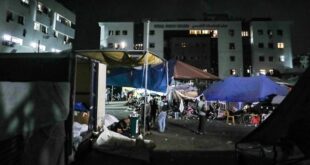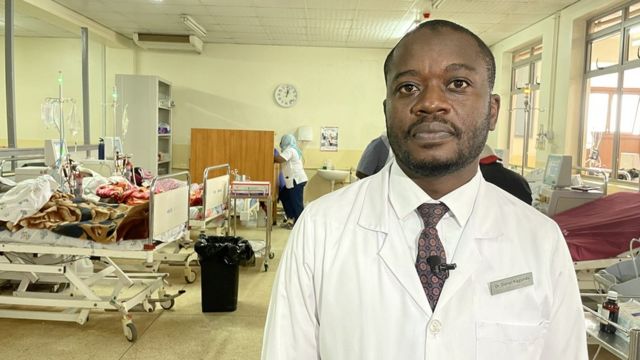
Uganda’s parliament is scrutinising a proposed law that would enable organ transplants to happen in the country for the first time, transforming the lives of thousands hoping for operations.
Annita Twongyeirwe had pictured a different future for herself.
But since being diagnosed with kidney failure three years ago, the 28-year-old is preoccupied either by having dialysis or thinking about the next session.
« It has taken over my life, » she says, looking defeated.
During dialysis a machine essentially performs the kidneys’ function and cleans the blood of waste products and excess fluids.
Each session lasts about four hours and she has to go to hospital twice a week. In between sessions she spends most of her time at home – a relative’s house – helping out with chores where she can, and keeping an eye on a WhatsApp group she created through which friends and well-wishers can donate money.
« I was this ambitious girl. I wanted to go further with studies. I would probably be somebody’s girlfriend or wife, so all that life is cut short. It took away all the dreams I had, » she adds.
A kidney transplant could bring them back.
But an operation abroad, currently the only option, comes with a price tag of about $30,000 (£26,000) – and is out of reach of most.
Hundreds of Ugandans, who like Ms Twongyeirwe cannot afford this, live on dialysis for as long as possible. But even at the subsidised price of around $100 a week for the treatment and drugs, that is more than five times the average total income in Uganda and so is only an option for a small fraction of the population.
The ward at Kiruddu National Referral Hospital on the edge of the capital, Kampala, is the only public health facility in the country that offers this service. Almost 200 patients attend the clinic regularly, many of them traveling long distances.
But they represent only a fraction of those countrywide living with kidney failure and in need of specialised care.
« They leave their families and livelihoods behind to live close to the hospital. This is an unnatural situation, » Dr Daniel Kiggundu, the only kidney specialist working at the unit, tells the BBC.
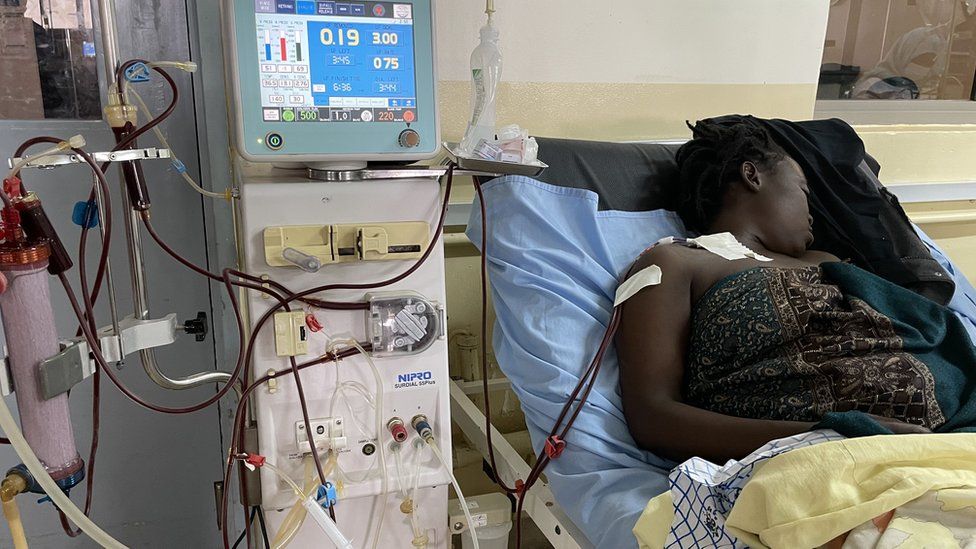
The ward is a cacophony of beeping machines, as nurses weave through dialysis stations attending to patients.
Some of those getting treatment seem extremely weak, drifting in and out of sleep, while others sit up and chat with their carers.
The clinic runs two shifts each day, each of them taking in about 30 patients. It operates dangerously close to full capacity and there is little spare time to prepare the patients for treatment.
When Ms Twongyeirwe is due for a session, she spends the night at the hospital in order to be ready in time.
She first realised she was unwell when her entire body began to swell in 2018 and she spent 18 months going from clinic to clinic before she got the right diagnosis.
Her life was turned upside-down.
She had to drop out of university where she was studying law and she lost her job. She also moved from her family home in western Uganda to Kampala, to live close to the hospital.
At home, the soft-spoken woman goes about washing dishes with such grace that, save for the plaster on her arm, it is hard to tell that she has just returned from a dialysis session.
‘I feel like a burden’
« When I return from the hospital I rest because the whole body is weak. Later, I do some work around the house to stay active, » she explains.
Ms Twongyeirwe raises the money needed each week from friends and family.
« I feel like a burden to people who help me pay for dialysis. Whenever somebody sees your call, they know you want money from them. »
She has also turned to family members to see if someone would want to donate a kidney.
She says a cousin had been willing but then changed their mind.
Even if that offer had remained, Ms Twongyeirwe would still have had to raise more money and get approval from the medical authorities to fly abroad for the operation. If the new law is passed then one of the hurdles would be removed.
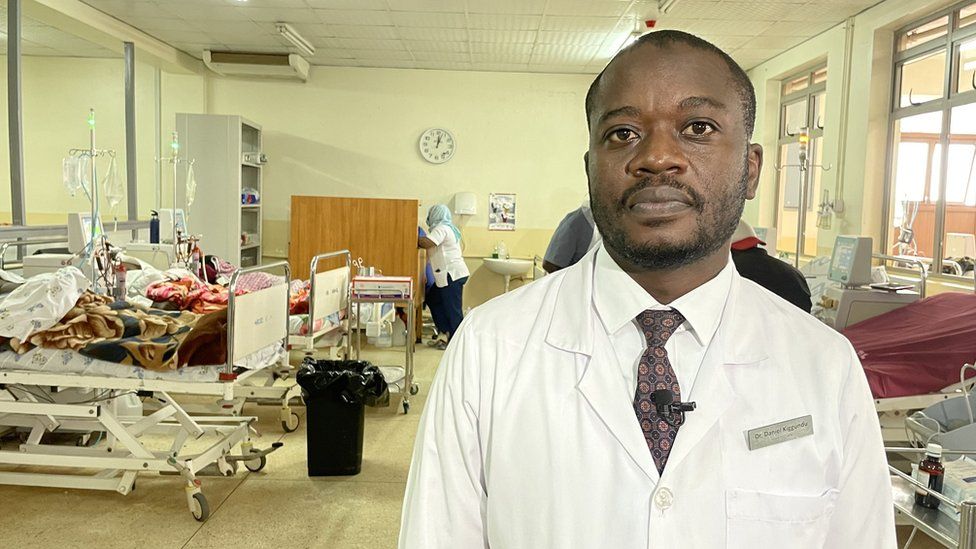
Uganda would be joining a short list of African countries, including South Africa, Tunisia and Kenya, that have both the regulations and health facilities for organ transplants to be possible within their borders.
At the moment India and Turkey are the most popular destinations for Ugandan kidney patients. Only close relatives are allowed to be donors and trips have to be approved by the Uganda Medical Board – to prevent organ trafficking or people being coerced to offer their organs.
But if parliament approves the new measure, then the process should be more straightforward and the cost for surgery and recovery care could come down to about $8,000.
Those backing it say Uganda needs special legislation to create a safe framework under strict regulation to make sure there is no abuse.
The proposal includes the creation of a national waiting list of organ recipients as well as the establishment of specialised transplant centres around the country. An operating theatre has already been set up at the main national hospital in Mulago, Kampala.
Organ banks will also be created for those who want to donate – and not just for kidneys
« We are [also] thinking of corneal transplants for the eyes [and] skin banks for patients who have burns, » says Dr Fualal Jane Odubu, chairperson of the Uganda Medical Board.
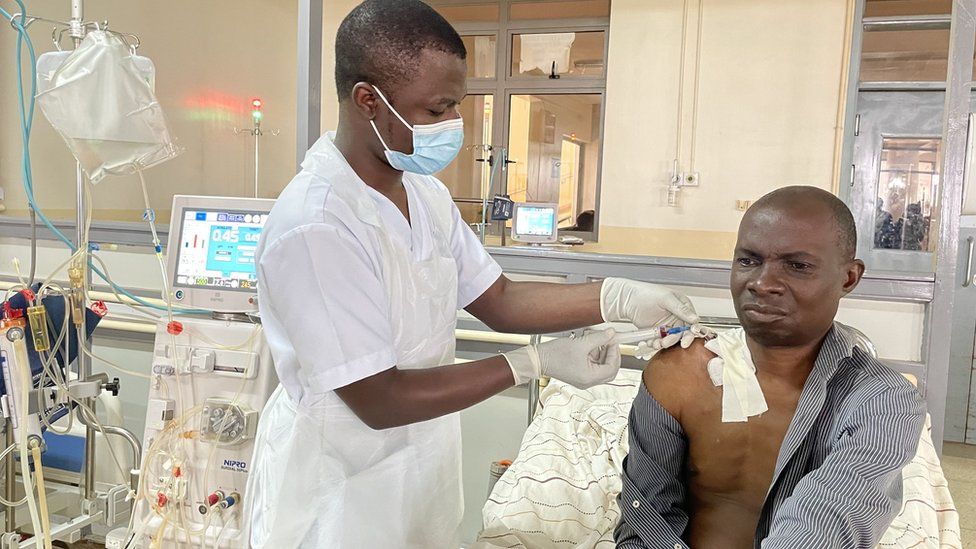
About 100 Ugandan health workers, including surgeons, nurses and post-surgery specialists have already been trained abroad, mostly in carrying out kidney transplantations.
Despite the hope that this could bring, there will still be a waiting list and the need to raise money.
Ms Twongyeirwe says that despair is never far away.
« The other patients and I have become family. The most difficult days are when you turn up at the clinic and find that someone died. We lost a little boy recently and that was very hard to cope with, » she says, holding back tears.
But for her the new law could be transformational.
« It would help patients like us be able to get transplants. Donating a kidney is giving someone another life.
« Some people fear incurring all the costs of traveling abroad, and you might get there, and the donor changes their mind. So if the transplant is being done here at home it’s less stressful. »

World Opinions – BBC News







